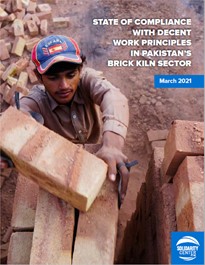The “Promoting Decent Work in Brick Kilns” project, conducted by the Trust for Democratic ducation and Accountability (TDEA) in partnership with Pattan Development Organization (Pattan) and Sangat Development Foundation (SDF) with Solidarity Center support, has contributed toward investigating the critical factors related to brick kiln workers’ working conditions and the legal, policy and administrative gaps that allow such conditions to exist. The project partners undertook multidimensional research, including reviewing relevant laws and existing studies by local and international organizations, and conducting primary qualitative research. The project partners conducted 10 focus group discussions (FGDs) with brick kiln owners and workers, government officials, brick buyers, and international funding agencies in Islamabad and Lahore. The overall objective of the research was to understand the issues faced by brick kiln workers and to highlight relevant stakeholders’ understanding of the existing working conditions. Specifically, the research aimed to explore the following questions:
1. To what extent are stakeholders familiar with decent work principles and the Decent Work Brick Kiln Framework (DWBKF) in the brick kiln sector? Through what mechanisms do stakeholders acquire this knowledge?
2. What are stakeholder attitudes toward the social and economic benefits of decent work?
3. To what extent are decent work principles per national and international labor standards being practiced in brick kilns? To what extent are decent work principles as per national and international labor standards being reported, monitored, and enforced in the brick kiln sector? What are the challenges to enforcement? What are the opportunities for enforcement?
4. What are the necessary conditions and incentives required for brick buyers to adopt decent brick buying?
5. What is the current state of decent work in brick kilns, including the use of bonded and child labor?
The brick kiln sector’s development has received little attention, and evidence gathered from the research reveals that brick kiln workers’ issues have been prevalent for decades. Although this sector remains one of the most profitable industries contributing to the Pakistani economy, it has mostly remained neglected by policymakers. During the FGD sessions, stakeholders’ responses consistently reflected the existing poor working conditions for brick kiln workers. A majority of them highlighted the lack of access to social security for workers, unregulated kilns, weak labor inspection, non-functional district vigilance committees (DVCs), lax implementation of regulations, and no specific law for the brick kiln sector. Other significant issues included a lack of necessary facilities like safety equipment, medical coverage, clean drinking water and social protection, low wages, and bonded and child labor. The project also ventured to update the DWBKF during its implementation. However, the FGDs participants had limited understanding and knowledge about the framework, and therefore, provided no feedback for its improvement. The first section of the report provides a brief description of the program and background, while the second section elaborates upon the purpose, scope, and methodology of the primary and secondary research. The third section highlights the findings and analysis from the FGDs and the literature review, focusing on brick kiln sector issues such as bonded and child labor, minimum wages, registration of workers, regulations, an inspection of brick kilns, social security, occupational health and safety, and other factors. The last section presents legal, policy, and administrative recommendations for promoting decent work at brick kilns.

